Building Resilience: Effective Strategies to Overcome Setbacks

In life’s journey, the ability to bounce back from adversity is not just beneficial; it’s essential. This process, known as building resilience, equips individuals with the fortitude to face challenges head-on, learn from them, and emerge stronger. The importance of resilience cannot be overstated in a world that is constantly changing, presenting new hurdles and setbacks. By fostering resilience, one not only navigates these difficulties more effectively but also sets the stage for personal growth and improved well-being.
The forthcoming sections will delve into understanding resilience, examining the emotional impact of setbacks, and exploring strategies for building resilience. These will include creating an action plan, acknowledging the role of self-care, and constructing a solid support system. Each segment aims to offer pragmatic advice and insights to empower readers to develop their resilience.
Understanding of Building Resilience
Table of Contents
Toggle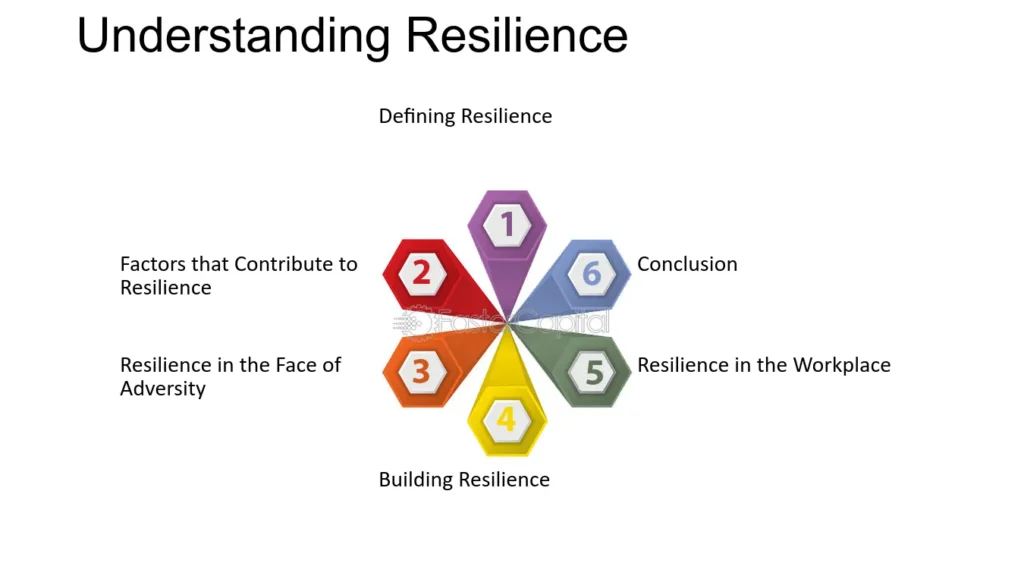
Resilience is the psychological quality that allows individuals to bounce back from adversities and challenges in life, emerging at least as strong as before. Rather than being overwhelmed by difficulties, traumatic events, or failures, highly resilient people find ways to adapt, emotionally heal, and continue progressing towards their goals.
Definition of Building Resilience
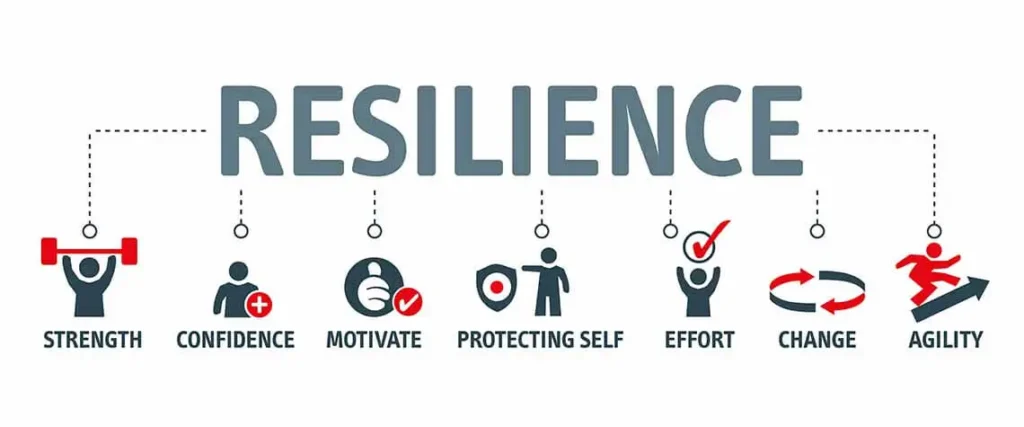
Resilience means being able to cope with and adapt to life’s misfortunes and setbacks. When faced with a setback or challenge, such as job loss, illness, disaster, or the death of a loved one, resilient individuals harness their inner strength to rebound. Resilience doesn’t eliminate the feelings of anger, grief, or pain associated with tough events. But it enables people to keep going, both physically and psychologically. It’s not about enduring hardship alone; reaching out to others for support is a key aspect of resilience.
Importance of Building Resilience
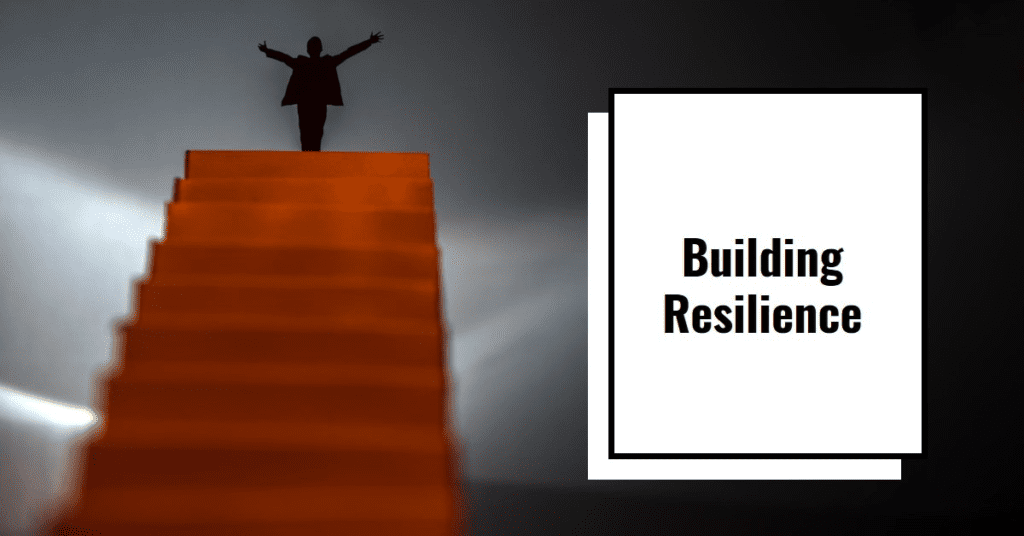
Building resilience is crucial as it can help protect individuals from mental health conditions like depression and anxiety. It also aids in coping with factors that increase the risk of such conditions, such as bullying or trauma. For those already experiencing mental health challenges, resilience can help them cope better.
Resilience gives individuals the strength to bounce back from life’s challenges. By developing resilience, people can tap into their strengths and support systems, increasing their chances of overcoming obstacles and working through problems. Different types of resilience, such as physical, mental, emotional, and social, can be developed to help individuals overcome various challenges.
The Emotional Impact of Setbacks

Common Emotional Reactions
Setbacks and disappointments can evoke a range of intense emotions, particularly for highly sensitive individuals who tend to experience feelings more profoundly. Even minor disruptions or changes can be unsettling, let alone major setbacks like job loss, the end of a relationship. The passing of a loved one, or a personal goal slipping out of reach.
The hardest part about coping with negative experiences is the overwhelming flood of emotions. They generate, such as shock, anger, hurt, sadness, guilt, embarrassment, rejection, humiliation, and a sense of loss. These feelings can be so intense that they feel destabilizing, as if they might destroy us.
In an attempt to keep the hurt at bay, many people try to hide or avoid their true feelings, pretending they are okay when they are struggling internally. This tendency stems from a concern about how others perceive us rather than prioritizing our own well-being.
Managing Negative Emotions
When faced with a painful setback or disappointment, it’s crucial to acknowledge and process the emotions rather than suppressing them. Here are some effective strategies for managing negative emotions:
1) Don't React
Immediately:
Give yourself time to process the shock and analyze the situation. Highly sensitive individuals often need more time to absorb information and think things through.
2) Express your Feelings:
Expressing emotions is key to coping with difficult situations. Talk to a trusted friend, write in a journal, or engage in creative outlets like writing, art, music, dance, or drama to express your feelings of anger, frustration, hurt, regret, and shame.
3) Practice Mindfulness Techniques:
Techniques like grounding exercises, box breathing, and body scans can help calm your nervous system and stabilize your physical state when you feel overwhelmed by emotions.
Challenge Negative
Thoughts:
Question the validity of your automatic negative thoughts by considering objective evidence, alternative perspectives, and potential actions you can take to influence the situation.
Strategies to Building Resilience
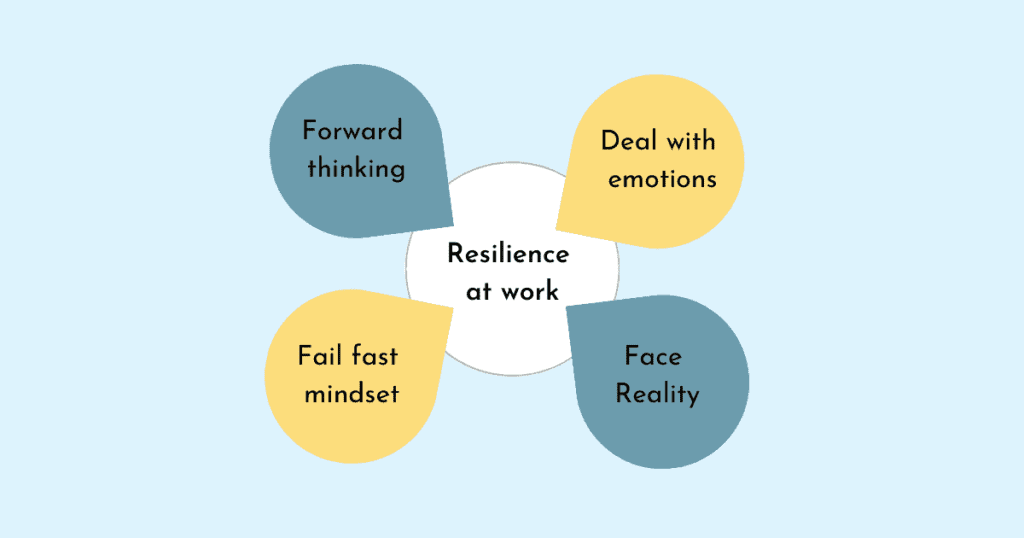
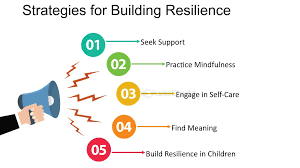
Acknowledging Emotions in Building Resilience
When faced with a setback or adversity, it’s crucial to acknowledge and allow oneself to feel the emotions that arise. Trying to suppress or deny feelings can be harmful, leading to a phenomenon known as “toxic positivity”. It’s important to give oneself permission to experience emotions like hurt, anger, frustration, or embarrassment without judgment.
Emotions have a physiological component, and suppressing them can have negative impacts on one’s well-being. As Dr. Jill Bolte Taylor explains, emotions trigger a chemical process in the body that lasts around 90 seconds. However, if one continues to ruminate on thoughts that prolong the emotional response, it can lead to a recurring physiological reaction.
Accepting What You Can't Change
Acceptance is a crucial aspect of building resilience, as it allows individuals to focus their energy on what they can control rather than dwelling on circumstances beyond their influence. Acceptance does not equate to resignation or passivity; instead, it involves recognizing that certain situations or events cannot be changed and finding ways to adapt and move forward.
One key aspect of acceptance is distinguishing between what can be changed and what cannot. By identifying the aspects of a situation that are within one’s control, individuals can direct their efforts towards constructive actions and solutions. Conversely, accepting the elements that cannot be altered can prevent wasted energy and frustration.
Creating an Action Plan
Creating an action plan is a crucial step in building resilience and overcoming setbacks. It involves setting realistic goals and taking small, consistent steps toward achieving them. Here are some key strategies to consider:
Setting Realistic Goals
When setting goals, it’s essential to strike a balance between ambition and achievability. Goals that are too easy may not provide a sense of accomplishment, while overly ambitious goals can lead to discouragement and demotivation.
The key is to set goals that challenge you to grow while remaining within the realm of possibility. Break down complex goals into smaller, manageable sub-goals or actions. This approach not only makes the process more manageable but also provides a sense of progress and motivation along the way.
It’s also important to have both achievable and dream goals. Achievable goals serve as stepping stones, providing a sense of accomplishment and boosting confidence. Dream goals, on the other hand, represent aspirations that may seem out of reach initially but can inspire you to push beyond your perceived limits.
Taking Small Steps Forward
Trying to make significant changes or get back on track after a setback without a plan can be overwhelming. Instead, focus on taking small, consistent steps that gradually build momentum.
Begin by identifying the habit or behavior you want to cultivate or reestablish. Then, look at your schedule for the upcoming week and plan specific times to work toward your goal. This could involve scheduling exercise sessions, setting aside time for a hobby, or blocking off periods for personal development activities.
The Role of Self-Care
Self-care plays a crucial role in building resilience and overcoming setbacks. It involves taking care of both physical and mental well-being, which can help individuals better cope with challenges and bounce back from adversities.
Conclusion
Through the journey of our exploration, it has become unequivocally clear how pivotal resilience is in navigating life’s unpredictable currents. At the heart of our discussion was the notion that rebounding from setbacks is not merely a testament to one’s inner fortitude but also an opportunity for profound growth and self-discovery.
By embracing the strategies outlined—acknowledging emotions, accepting the unchangeable, crafting an action plan, prioritizing self-care, and constructing a robust support system—individuals arm themselves with the tools necessary to not only withstand the tempests of life but to emerge from them stronger and more grounded.
As we close this narrative, it’s essential to underscore the human essence of resilience; it’s a deeply personal journey that intertwines empathy, understanding, and the collective wisdom gleaned from our shared experiences. This humanized perspective encourages not just self-compassion but also a recognition of our interconnectedness in navigating life’s challenges.
FAQ's of Building Resilience
Q. What are some effective methods to develop resilience?
To enhance your resilience, consider adopting these strategies:
- Get Connected: First Cultivate strong, supportive relationships with family, colleagues and friends to provide encouragement and guidance through all times.
- Learn from Experiences: Use past experiences as lessons for growth.
- Find meaning in each day: Make your daily activities meaningful.
- Take proactive steps: Engage actively in shaping your life.
- Self-care: Prioritize your physical and mental health.
- Stay optimistic: Maintain a hopeful outlook on life.
Q. What are the 7 C's crucial for resilience?
The 7 C’s essential for fostering resilience include:
1) Competence: Developing skills and the ability to handle situations effectively.
2) Confidence: Building self-belief in your abilities.
3) Connection: Establishing strong personal relationships.
4) Character: Cultivating inner strength and integrity.
5) Contribution: Giving back to others and your community.
6) Coping: Managing stress and adversity effectively.
Q. What are three tactics to build resilience in challenging or stressful conditions?
Building resilience during tough times can vary by individual, but here are some general approaches:
- Connect with nature: Spend time outdoors to rejuvenate your spirit.
- Relaxation: Allocate time for activities that help you unwind and relax.
- Engage in Hobbies: Develop your interests to provide joy and distraction.
- Practice Self-Compassion: Treat yourself with kindness and understanding.
- Maintain Physical Health: Keep up with physical activities and a healthy lifestyle.
Q. What does it mean to be resilient and learn from setbacks?
Resilience is the capacity to recover quickly from difficulties. It involves bouncing back from failures, learning essential lessons, and moving forward with greater strength. Essentially, resilience empowers you to overcome challenges and live a fulfilling life despite setbacks.
